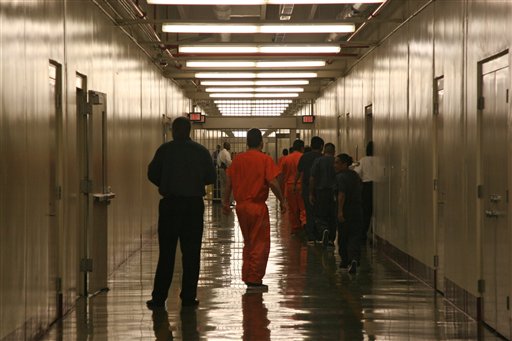Joliet detention-center talks include private prison firm
By Chip Mitchell

Joliet detention-center talks include private prison firm
By Chip Mitchell
City Manager Thomas Thanas told WBEZ he had engaged in a “preliminary conversation” with officials of Nashville-based Corrections Corporation of America to see “whether Joliet might be a suitable site” for a facility that U.S. Immigration and Customs Enforcement wants in the Chicago area.
Thanas declined to say when and where the conversation took place or what details were discussed. “We have not reviewed plans,” he said. “Nothing has been filed on a formal basis.”
Joliet officials are “not talking about any specific sites at this point,” Thanas said. He added that “a facility like this could not be located near a residential area, schools or a commercial district.”
Thanas referred questions about site possibilities to CCA, whose spokesman referred inquiries to ICE, which declined to discuss the Joliet project.
The federal agency sent a statement that said building a Chicago-area detention center would help improve immigrant confinement conditions and enable “locating detainees closer to where they are apprehended so that they can be near their families, community resources and the ICE field office.”
What would Joliet get? “Hundreds of construction jobs and hundreds of permanent jobs,” Thanas said. “I’m always interested in projects that have an opportunity to create jobs and revenues for our school district.”
Federal officials met with Thanas about the project October 17 in Washington, he said. “It was a fact-gathering opportunity for both them and me.”
Thanas also briefed some City Council members about the detention-center possibility.
But officials managed to keep the project out of public view until the Chicago Tribune revealed it late Wednesday. Within hours, some Joliet activists and the Illinois Coalition for Immigrant and Refugee Rights began organizing opposition.
“We don’t believe you should be making a profit off of tearing families apart because they’re undocumented,” said Richard Rodríguez, a Joliet resident who chairs the Mexican American Coalition of Will County. “There should be comprehensive immigration reform. Address the issue properly.”
Thanas replied that national immigration policy was not Joliet’s business. “That’s a matter of federal concern,” he said.
Joliet’s nine City Council members on Thursday declined to comment or did not return messages about the project.
The Joliet talks follow a highly publicized setback for ICE and CCA in south suburban Crete, where the agency wanted the company to build and run a 788-bed detention center. Village trustees rejected the plan June 11 after months of protests by residents, human-rights advocates and public-sector unions.
CCA had greater success in Springfield. The company lobbied against Illinois legislation that would have banned government agencies at the local and state levels from contracting with private firms to build or run civil detention centers. The bill passed the Senate in March but stalled after a series of close House floor votes May 31.